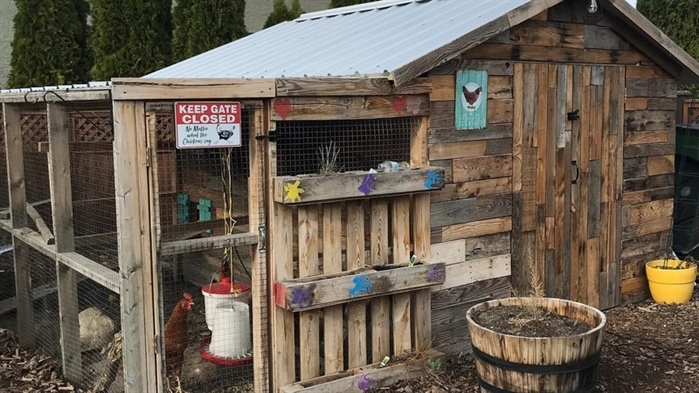Gaetan Benoit’s children sit with the chickens Eggie and Eggo, who they consider their pets.
Photo credit: SUBMITTED / Gaetan Benoit
April 11, 2021 – 3:35 p.m.
A Kelowna family is advocating amendments to the statutes to allow backyard chickens in smaller yards.
Glenmore-resident Gaetan Benoit launched an online petition this week to amend the city’s current statutes after he and his family were visited by a statutory officer who received a complaint about his cooperative.
His family currently has a chicken coop and two chickens named Eggie and Eggo on their 0.22 acre property. City statutes only allow up to 10 urban chickens on lots larger than 0.5 acres.
“I grew up in Europe and had chickens when I was younger. So it was always something that I had in the back of my mind, that I wanted my kids to experience the same, and we always believed that it was a healthy way to get food. Eggs and your kids get about nature, “said Benoit.
“We believe this will have a positive impact on the community as it will reduce the need for transportation for chickens in your own yard (they help make fertilizer). You can reduce the amount of kitchen waste so I don’t get a lot of urban chickens see negative points. ”

A Kelowna family would like to see Kelowna’s statute change regarding urban chickens.
Photo credit: Change.org/Gaetan Benoit
They have had chickens for a year and talked to their neighbors before building a hen house, he said. They were surprised to receive a visit from a constitutional official on Tuesday, April 6th.
They were well aware of the statutes, but Benoit said it was a risk they wanted to take as many other backyard hens in Kelowna have and had no problems.
To date, the petition to Kelowna City Council has garnered more than 1,000 signatures.
“We know so many who want backyard chickens, and we know so many people who have backyard chickens and one day they’re scared that someone will knock on their door and say they need to get rid of them,” said Benoit.
Other municipalities in the region allow chickens on smaller lots. In Kamloops, residents can own up to five chickens on a single-family or duplex lot that is at least 370 square feet (0.09 aces), has a fenced back yard, and a regulatory pen. In Vernon, up to four chickens can be kept on residential properties.
The Kelowna petition has gathered signatures from across the country, he said.
“I just want to show the city that there is a real interest in this situation right now across the country and the region,” he said. “We have to be realistic at this point, but we have hope.”
Last spring, sellers saw a surge in demand for backyard chickens due to the pandemic.
READ MORE: Self-Isolation Brings Backyard Chickens A Boost
His two daughters take care of them and play with them and they are considered pets, Benoit said.
“We don’t want the City of Kelowna to let everything go … We believe they should limit the number of chickens in the backyard. We believe roosters should not be allowed in residential areas and hen house owners properly care for the smells (to prevent them). We believe regulation is a good thing. We don’t want the chicken business to be the wild west. ”
Benoit is hoping to come up with an argument for changes to the statutes in the city and asks others in the same boat to contact him via email.
Dave Gazley, the city’s statute service chief, said this was the first time he had been made aware of the backyard chickens problem and he had not received any complaints about it this week.
You can find Benoit’s backyard hen petition on Change.org.
To contact a reporter for this story, email Carli Berry or call 250-864-7494 or email the editor. You can also send photos, videos or news tips to the newsroom and enter to win a monthly raffle.
We appreciate your comments and opinions on our stories, but play nice. We will not censor or delete comments unless they contain unrelated statements or links, unnecessary vulgarity, false facts, spam or obviously fake profiles. If you have any concerns about the comments, please email the editor using the link above.
News from © iNFOnews, 2021










